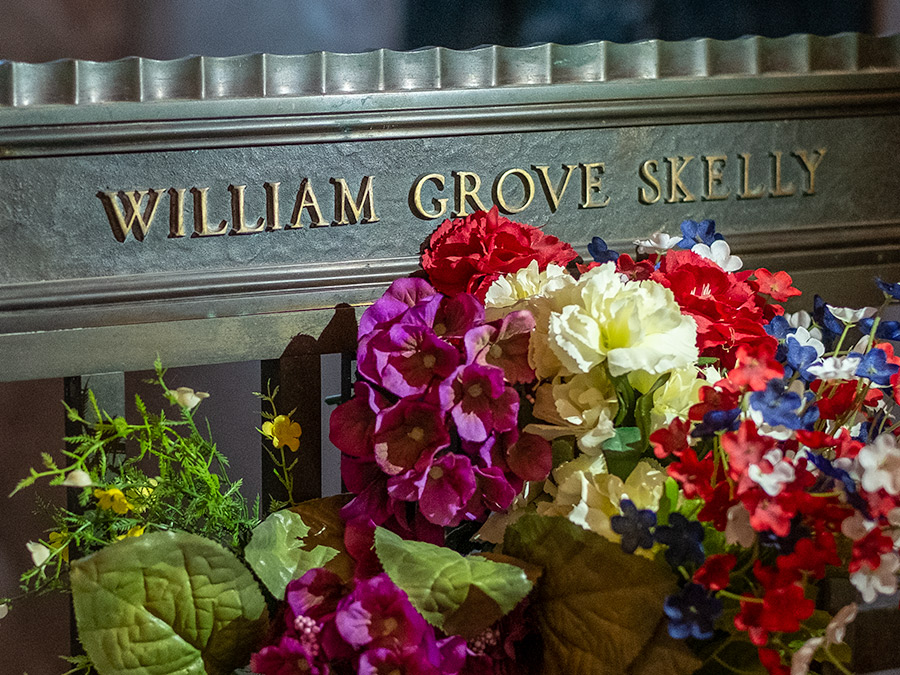 Prof. Rodger A. Randle
Prof. Rodger A. Randle
This section from the mural at Tulsa International Airport is a reminder of the global reach of Tulsa's oil industry.
the forces That Shaped Us
The Oilmen
The character of the early oil barrons is an influence still felt in Tulsa's culture.
Many of the men who achieved success in the early days of the petroleum industry in Tulsa were attracted here from the East as news of the new oil finds spread across the country. Many were already knowledgeable about the business and had experience in America’s original fields in Pennsylvania and Ohio, but the opportunities offered in Oklahoma greatly exceeded the possibilities for success that the older and established oil fields offered.
It was a turbulent era of fortunes quickly being gained and fortunes being lost. Men that were wildcatters on one day became civic leaders on the next as fortunes made in the oil fields allowed then to rise overnight to positions of civic prominence and leadership. The great wealth that they had amassed in Tulsa gave them power and social position in the city. The influence of these wealthy oilmen was felt throughout the city. They, and their wives, set examples that were felt on all levels of Tulsa society. They had brought with them to Tulsa cultural values of the East, and their position in the community served to transmit these values to aspiring Tulsans who saw in these leaders a model to be followed. As these oilmen gained success, they worked to have their personal success reflected in the city that had become their home. They wanted their city to be a place of which they could be proud, a city with a grandness that mirrored their own. Attitudes derived from the sudden wealth of the oil fields, and from those cultural qualities they had brought with them from the East, pushed our early leaders to aspire for Tulsa to become something more than just another boomtown. They wanted a city with permanence, and a city with class. We see how wonderfully they succeeded in achieving their aspirations when we look at the architecture of the late 192020s in Tulsa: the Philtower Building, Boston Avenue Church, the National Bank of Tulsa building, the Mayo Hotel, Trinity Episcopal Church, and many others. One of the most important values they implanted in the city was communitarianism, a belief that our personal success is tied to the well-being of the overall community. This ideal that Tulsa should be a place that offered quality public services accessible to all of society was reflected in many areas of Tulsa life, including in our schools. Tulsa's Central High School for many years was rated one of the very top high schools in the United States. It was a public school attended by the sons and daughters of the oil barons as well as by the children of factory workers. This ideal was also expresses through our extensive public park system, crowned by Mohawk Park … in its day a place with extensive bridle trails for horseback riders and ponds for boaters, in addition to golfing and other recreational opportunities found in large municipal parks in the East. The oil business could be precarious. Some rose to the top only to precipitously fall back to the bottom. The social list of the prominent wealthy families of the city often changed from generation to generation over the years, and Tulsa has never had a strong and long-lived hereditary upper-class of the sort that the old cities of the East has known. The character of the early oil barons was imparted to our community and passed down to later generations, but the passing of time, combined with population growth fed by in-migration from rural Oklahoma and other parts of the country, has diluted over the years the strength of its influence. Nevertheless, the ideal of communitarianism, planted in Tulsa many decades ago, still represents core values that most Tulsans share and still motivates our city’s civic leadership. There are lots of stories that can be told about the early days of the oil industry. We lived next door for many years to Mr. and Mrs. Al Cashman. He had been W. G. Skelly’s landman and had lots of opportunities to see behind the scenes at critical periods of Tulsa’s petroleum history. One of the stories he tells is about being in the office on a Saturday morning, a common practice among professional people up until recent years. His secretary came in and told him that there was a man in the lobby wanting to visit with Mr. Skelly, but his clothes were rumpled and he needed a shave. He looked a little down and out and had probably come to ask for a handout. Al says he went into Skelly’s office and told him about the visitor, repeating the secretary’s description of the man. Al says that Mr. Skelly nevertheless agreed to see him. The man, it turned out, was J. Paul Getty and he was there seeking to buy the company. Al says Getty had probably spent the night on an airplane getting to Tulsa and that’s why his appearance was rumpled and he needed a shave. Because of his appearance, the secretary had mistaken a man with sufficient money to buy the company with someone down and out, a reminder to all of us about duding people by their appearance alone. Another of Mr. Cashman's stories was about an Osage Nation lease auction under the old “Million Dollar Elm” in Pawhuska. The Osage National controlled all of the mineral rights in Osage County and leases to drill were sold by the tribe at public auction. During the boom years of the 1920’s the interest in leases was so great that the tribe had to hold the auctions outdoors to accommodate all the bidders since there was no building big enough in Pawhuska to hold everyone. For the comfort of the person running the bidding, the auctions were generally held under the shade of a particular elm tree, hence the name “Million Dollar Elm” attached itself to the tree because of the millions of dollars of leases auctioned off under its shade. On one occasion when Cashman and Skelly went to Pawhuska to participate in the auction, Skelly started bidding on a certain lease once the biding intensified. It was not a parcel on which they had planned to bid, and Mr. Cashman was surprised to see his boss putting money up to drill on land they knew nothing about. Afterwards, he asked Skelly why he bid on a lease when they know nothing about that property. Skelly replied that yes, they knew nothing about that land, but that he knew a lot about the main bidders. Things like W. G. Skelly wagering big money just on a hunch that the other bidders might know something he didn’t know is an example of the attitude of those days. Carl Sandberg, in one of his poems, also tells a story with humorous insight into the oilmen in those days. He tells the story of an oilman who was sitting in his office one day without much to do and decided, for fun, to start a rumor that a big gusher had just come in down in Hell. As soon as the rumor spread around, some of the oilman's friends packed their bags and headed to Hell. As the oilman saw them depart he started reflecting on the rumor he had spread and decided that there might be something to it after all, and he went to Hell too. Although the days of the early oil titans passed long ago, their influence in Tulsa remains. The petroleum industry is still a significant, but smaller, part of our economy, but what most strongly remains from earlier days is the influence in our culture and way of life. A lot remains to remind us of them, seen and unseen. The vocabulary of the oil field is still spoken, and terms like landman, roughneck, roustabout, and gusher are commonly understood, even if the occasions to use them are fewer than before. Petroleum company names are still seen downtown, and our most elegant and iconic buildings are a visible heritage of our days as the center of the oil business in America. Most of the mansions of the oil barons in the neighborhoods near downtown still stand and are a connection to their lives. The Golden Driller, however, built before most living Tulsans were born, serves today as a symbol of our past more than it represents our present.
Perpetual flowers are kept at the crypt of William Skelly in the mausoleum at Tulsa's traditional Rose Hill Cemetery.

The continuing influence of oil in Tulsa is symbolized by these tanker cars on a siding in front of City Hall.

Throughout Tulsa acknowledgements of the generosity of wealthy oilmen can be found, such as this plaque in Trinity Episcopal Church in downtown Tulsa.
 Prof. Rodger A. Randle
Prof. Rodger A. RandleThe photos on this page are © Rodger Randle .
